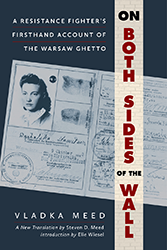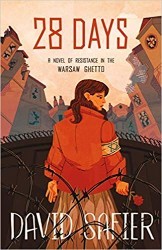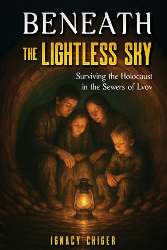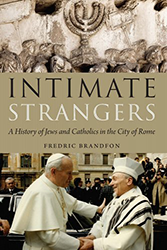Forty-five years ago, when the concept of a mass trove of Holocaust literature was still in its infancy but about to leap onto the page, a raw, vividly uncompromising memoir by a survivor opened up a whole new world of understanding of what had happened to the Jews of Europe during the war. Now that book, which burst open the bubble that had shielded readers from the intense personal trauma suffered by so many, has been reissued in a new edition, this time with a forward by the author’s granddaughters, who offer their pledge to make sure the Holocaust is never forgotten and never repeated.
Jack Eisner’s The Survivor of the Holocaust offered a life-changing read back when it was first published, and offers a life-changing read yet again today, standing head and shoulders above many of the memoirs that have been written since 1980, when it first appeared.
Eisner was a thirteen-year-old music student when the Nazis invaded Poland and ended his childhood in an instant. Written in clipped, fiery prose, the story races through the author’s incarceration in the Warsaw Ghetto, bringing the reader along as he smuggles in food and arms to sustain the fighters of the doomed but historically significant and heroic uprising. He tells us in poignant detail how he endured a series of brutal imprisonments in concentration camps after escaping from the Ghetto, and of the one hundred members of his family who perished in the Holocaust, including all thirty of his first cousins. He introduces us to the gangs of young teens who become his family after he loses his own.
The book is enhanced with photographs of family members and friends, and this new edition includes some updated information on both the Jews and the Nazis who touched Eisner’s life. Overall, it is a devastating chronicle of the author’s impassioned desire to survive, his unshakable belief in the power of resistance, his deep wells of courage — and, propelling it all, his strong motivation to find the girl he loves.
Memoirs hold a special power within the genre of Holocaust literature simply because their stories are true. But more than authenticity is needed for success — the story must contain several of the elements of fiction: a clear narrative arc, an emotional tie to the hero, a strong sense of setting, a satisfying end. And Eisner’s book succeeds because it reads just like a novel.
Readers of Holocaust stories instinctively know the odds are slim that the heroes will survive, but in memoirs, we know from the outset that they do. We know that no matter how much suffering the books hold, at the end there will be a life-affirming message that we can take to heart and carry into our daily lives in a way that will provide us with extra strength to handle our own struggles, small though they may be in comparison to what the Holocaust victims were forced to endure. This is a great part of their appeal.
As Eisner takes us through his ordeal — his trip through living hell — we are buoyed by the fact that he was somehow miraculously able to turn his experiences into a set of principles and an underlying philosophy that will guide him through the rest of his life. As smart and lucky as he was to survive each torturous event that fate and the Nazis threw in his path, he was equally smart and lucky to turn the lessons he learned into the best possible life choices after the war ended.
Combining toughness with gentleness, instinct with business acumen, Eisner founded a highly successful international trade company. But more than that, he dedicated his life to the memory of the Holocaust through establishing war memorials, organizations to teach the dangers of antisemitism, and a foundation to tell the true story of the Holocaust.
Linda F. Burghardt is a New York-based journalist and author who has contributed commentary, breaking news, and features to major newspapers across the U.S., in addition to having three non-fiction books published. She writes frequently on Jewish topics and is now serving as Scholar-in-Residence at the Holocaust Memorial & Tolerance Center of Nassau County.





